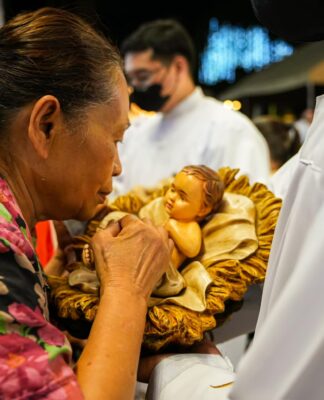IN A WORLD where life is treated as if it were a commodity that money can buy and that power and technology can control, does advocacy for life have a chance? If it does, how is it promoted, and what is the role of educational institutions—especially Catholic schools in its promotion?
“The long revered values of life are already questioned today, like its dignity, sanctity and inviolability, which come in the context of bigger issues whose traditional ethical dimensions have been challenged by our engineering,” said UST Rector Fr. Tamerlane Lana, O.P. in his lecture “Advocacy for Life in a Catholic University” last April 8 at the Thomas Aquinas Research Complex Auditorium.
The lecture was part of Theology Week 2003, sponsored by the Faculty of Sacred Theology in cooperation with the Institute of Religion, the Graduate School, and the Social Research Center. The celebration marked the theme “Life, Hope, Holiness”.
Indeed, as medical technology advances in an increasingly fast pace, ethical questions arise such as euthanasia and cloning arise.
Fr. Lana mentioned the papal encyclical, “Evangelium Vitae”, wherein John Paul II “challenged the faithful to proclaim, to celebrate, and to serve the gospel of life, in order to avert what he called ‘culture of death’ that is looming in our society today.”
In response to this challenge, Catholic institutions must step forward in pursuit of their mission, which should primarily be the proclamation of the gospel of life. Fr. Lana believes the Catholic University is in an advantageous position to take that challenge, given its structure, functions, and resources. Teaching, research, and advocacy can be used to communicate ethical and religious principles that pertain to life.
“Advocacy for life must be undertaken by the Catholic University within its competence—the ethical and religious principles that give full meaning to human life,” Fr. Lana said.
And to engage in the advocacy for life, the Rector said that the Catholic University must be firm in its adherence to principles and values espoused by our Catholic faith and morals with regard to human life.
According to the Rector, among the fundamental principles regarding human life which Catholic Universities must staunchly defend are: “1) the life of every individual is created in the image and likeness of God, and is therefore sacred and inviolable from natural conception to natural death; 2) the life of an individual is a great good of the person and not just a good for the person. Lief is not merely instrumental to other goals—it is an intrinsic good; 3) the value of any individual life is not diminished by physical or mental handicap, economic circumstances or state of dependency based on age; 4) all persons aer entitled to dignified death in God’s time, but directly killing patients or assisting in their suicide is abhorrent regardless of poor quality of life or survival expectancy; and 5) the duty to preserve life does not involve the obligation to prolong the dying process by technological measures.”
Research plays a pivotal role. Meanwhile, advocacy takes place “when such principles are communicated through organized efforts and actions with the intention of influencing public opinions and attitudes, decision makers, legislators and authorities to promote life itself and to denounce acts and measures that violate its dignity and sacredness.”
Fr. Lana mentioned the recently formed UST Committee on Social Concern and Advocacy under the Office of Religious Affairs in coordination with the Social Research Center. The committee has an “advocacy desk” that monitors, among relevant issues, executive and legislative measures that would “run counter to our efforts to promote the dignity of life.”
Two legislative bills, those on the Reproductive Right of Women and on Patients’ Rights, are currently being scrutinized by the committee to see whether there are provisions that are contrary to the dignity of life.
The Rector believes UST has what it takes to take on this responsibility, but it is not and should not be alone.
“Although UST could take the initiative of undertaking the task of advocacy, it would, of course, make a great difference if it does this in concert with the other Catholic universities in the Philippines. For there will be greater voice that will be heard especially by those who have the power to enact and implement law and policies that could either promote its dignity and inviolability or undermine totally the values that are inherent to it,” he said. Rose A. Jabeguero













